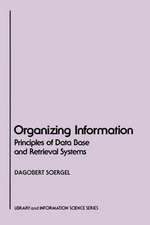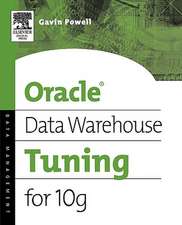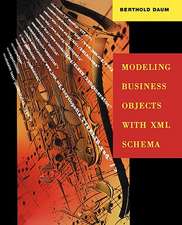Physical Database Design: The Database Professional's Guide to Exploiting Indexes, Views, Storage, and More: The Morgan Kaufmann Series in Data Management Systems
Autor Sam S. Lightstone, Toby J. Teorey, Tom Nadeauen Limba Engleză Paperback – 4 iun 2007
Physical Database Design discusses the concept of how physical structures of databases affect performance, including specific examples, guidelines, and best and worst practices for a variety of DBMSs and configurations. Something as simple as improving the table index design has a profound impact on performance. Every form of relational database, such as Online Transaction Processing (OLTP), Enterprise Resource Management (ERP), Data Mining (DM), or Management Resource Planning (MRP), can be improved using the methods provided in the book.
- The first complete treatment on physical database design, written by the authors of the seminal, Database Modeling and Design: Logical Design, Fourth Edition
- Includes an introduction to the major concepts of physical database design as well as detailed examples, using methodologies and tools most popular for relational databases today: Oracle, DB2 (IBM), and SQL Server (Microsoft)
- Focuses on physical database design for exploiting B+tree indexing, clustered indexes, multidimensional clustering (MDC), range partitioning, shared nothing partitioning, shared disk data placement, materialized views, bitmap indexes, automated design tools, and more!
Din seria The Morgan Kaufmann Series in Data Management Systems
- 34%
 Preț: 393.13 lei
Preț: 393.13 lei - 20%
 Preț: 426.83 lei
Preț: 426.83 lei - 36%
 Preț: 310.89 lei
Preț: 310.89 lei - 20%
 Preț: 545.22 lei
Preț: 545.22 lei - 20%
 Preț: 420.68 lei
Preț: 420.68 lei - 20%
 Preț: 449.95 lei
Preț: 449.95 lei - 20%
 Preț: 553.54 lei
Preț: 553.54 lei - 20%
 Preț: 855.18 lei
Preț: 855.18 lei - 20%
 Preț: 745.06 lei
Preț: 745.06 lei - 20%
 Preț: 584.79 lei
Preț: 584.79 lei - 20%
 Preț: 396.04 lei
Preț: 396.04 lei - 20%
 Preț: 549.23 lei
Preț: 549.23 lei - 35%
 Preț: 243.25 lei
Preț: 243.25 lei - 20%
 Preț: 402.52 lei
Preț: 402.52 lei - 20%
 Preț: 821.19 lei
Preț: 821.19 lei - 31%
 Preț: 237.87 lei
Preț: 237.87 lei - 20%
 Preț: 268.09 lei
Preț: 268.09 lei - 20%
 Preț: 556.46 lei
Preț: 556.46 lei - 20%
 Preț: 514.10 lei
Preț: 514.10 lei - 20%
 Preț: 398.74 lei
Preț: 398.74 lei - 20%
 Preț: 623.68 lei
Preț: 623.68 lei - 20%
 Preț: 472.79 lei
Preț: 472.79 lei - 20%
 Preț: 148.30 lei
Preț: 148.30 lei - 20%
 Preț: 776.53 lei
Preț: 776.53 lei - 20%
 Preț: 863.52 lei
Preț: 863.52 lei - 20%
 Preț: 934.90 lei
Preț: 934.90 lei - 16%
 Preț: 184.00 lei
Preț: 184.00 lei - 30%
 Preț: 301.70 lei
Preț: 301.70 lei - 20%
 Preț: 643.99 lei
Preț: 643.99 lei - 20%
 Preț: 365.22 lei
Preț: 365.22 lei - 20%
 Preț: 601.92 lei
Preț: 601.92 lei - 20%
 Preț: 580.20 lei
Preț: 580.20 lei - 20%
 Preț: 608.12 lei
Preț: 608.12 lei - 20%
 Preț: 660.26 lei
Preț: 660.26 lei - 20%
 Preț: 501.90 lei
Preț: 501.90 lei - 20%
 Preț: 613.03 lei
Preț: 613.03 lei - 20%
 Preț: 546.23 lei
Preț: 546.23 lei - 20%
 Preț: 559.10 lei
Preț: 559.10 lei - 33%
 Preț: 278.29 lei
Preț: 278.29 lei - 32%
 Preț: 189.98 lei
Preț: 189.98 lei - 32%
 Preț: 281.67 lei
Preț: 281.67 lei - 20%
 Preț: 451.76 lei
Preț: 451.76 lei - 20%
 Preț: 463.52 lei
Preț: 463.52 lei - 20%
 Preț: 508.56 lei
Preț: 508.56 lei - 20%
 Preț: 231.88 lei
Preț: 231.88 lei - 8%
 Preț: 355.29 lei
Preț: 355.29 lei
Preț: 446.06 lei
Preț vechi: 557.57 lei
-20% Nou
Puncte Express: 669
Preț estimativ în valută:
85.43€ • 88.02$ • 71.56£
85.43€ • 88.02$ • 71.56£
Carte tipărită la comandă
Livrare economică 22 februarie-08 martie
Preluare comenzi: 021 569.72.76
Specificații
ISBN-13: 9780123693891
ISBN-10: 0123693896
Pagini: 448
Ilustrații: 150 illustrations
Dimensiuni: 191 x 235 x 28 mm
Greutate: 0.77 kg
Ediția:New edition.
Editura: ELSEVIER SCIENCE
Seria The Morgan Kaufmann Series in Data Management Systems
ISBN-10: 0123693896
Pagini: 448
Ilustrații: 150 illustrations
Dimensiuni: 191 x 235 x 28 mm
Greutate: 0.77 kg
Ediția:New edition.
Editura: ELSEVIER SCIENCE
Seria The Morgan Kaufmann Series in Data Management Systems
Public țintă
Database designers and database administrators working with large databases and data warehouses, who want to improve processing time for transactions and information access, resolve storage issues, and make life better for all of us.Cuprins
1 Introduction to Physical Database Design2 Basic Indexing Methods3 Query Optimization and Plan Selection4 Selecting Indexes5 Selecting Materialized Views6 Shared-nothing Partitioning7 Range Partitioning8 Multidimensional Clustering9 The Interdependence Problem10 Counting and Data Sampling in Physical Design Exploration11 Query Execution Plans and Physical Design12 Automated Physical Database Design13 Down to the Metal: Server Resources and Topology14 Physical Design for Decision Support, Warehousing, and OLAP15 Denormalization16 Distributed Data AllocationAppendix A A Simple Performance Model for DatabasesAppendix B Technical Comparison of DB2 HADR with Oracle Data Guard for Database Disaster Recovery
Recenzii
"I highly recommend Physical Database Design by Lightstone, Teorey, and Nadeau. The book covers fine aspects of physical design -- issues such as the effects of different approaches to indexes, tradeoffs in materializing views, and details of physical data layout. Unlike other books, it does not focus on a particular product, but instead covers the deep principles that cut across products. The book addresses both transaction intensive applications (OLTP) as well as data warehouses (OLAP). Their new book is a welcome addition to the literature." --Michael Blaha, OMT Associates, Inc.
"This is an excellent book on physical database design, giving pragmatic models and advice. It has a wealth of information for both the student and for the practitioner -- presenting analytic models and practical tips that are demonstrated with examples using Oracle, DB2, and Microsoft SQL Server." --Jim Gray, Microsoft Research
"This is an excellent book on physical database design, giving pragmatic models and advice. It has a wealth of information for both the student and for the practitioner -- presenting analytic models and practical tips that are demonstrated with examples using Oracle, DB2, and Microsoft SQL Server." --Jim Gray, Microsoft Research










